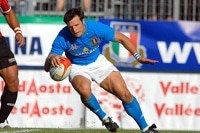A popular and fast paced outdoor contact sport, rugby football finally turned professional after South Africa hosted the World Cup in 1995.
Attracting sporty individuals of all shapes and ages, there are currently around 2,000 players competing in the Rugby Union Premiership (otherwise known as the Guinness Premiership) in England alone.
There are also professional, semi-professional and part time teams competing in National Division One.
Rugby Union is a highly competitive sport and one which relies upon fitness, dedication, determination and skill to succeed. It is governed by the International Rugby Board (IRB).
Rugby Union tournaments take place throughout the year. These include the Heineken Cup and the European Challenge Cup. The best rugby players, at club level, can also be invited to represent their country in international tournaments.
The most important tournament in international rugby is the World Cup, which takes place every four years. In Europe, the Six Nations is a major annual event in the rugby calendar with England, France, Ireland, Italy, Scotland and Wales competing for the prestigious title.
Salary
Salaries are largely dependent on skills, experience, age, specialist position and the club. In most cases, premiership clubs offer starting salaries in the region of £20,000 while top flight players, competing at international level, can earn over £200,000 per annum.
Depending on the club, this figure can increase with additional appearance fees, match win bonuses and sponsorship deals.
Responsibilities
- Players can be required to train up to five times a week and play matches on weekday evenings or during weekends.
- Some away fixtures will require overnight and overseas travel.
- Professional players must be willing to make public appearances to promote sport and highlight charities affiliated with the club. Club representatives may also be expected to network with club sponsors.
- Players may be requested to conduct media interviews.
- Players in the public eye will be expected to behave in a professional and responsible manner both on and off the field.
Qualifications
Although no qualifications are required, many players are advised to continue their studies and consider their career after rugby. Most players retire in their early to mid 30’s although injuries can force an even earlier retirement.
Many clubs encourage players to combine their training schedule with a study programme. Individual clubs and the Professional Rugby Players’ Association (PRA) will provide further information on this.
Skills
- High level of fitness.
- Competitive nature.
- Determination and perseverance.
- Ability to train hard and undertake necessary extra training to maintain fitness level.
- Willingness to maintain a healthy lifestyle to reduce risk of injury.
- Skills and talent in playing rugby.
- Dedication and motivation.
- Good self discipline.
- Team player.
- Ability to perform under pressure.
- Good communication skills with other team members and, in some cases, the media.
- Ability to accept and learn from criticism.
Working conditions
Professional rugby players undertake physical, tactical and technical training at their club five days a week. This can take place indoors or outdoors, in all weather.
Most games take place at the weekend although evening matches during the week are also played. Away trips can involve overnight stays away from home.
Generally, the working day of a rugby player is shorter than many other occupations although training periods can be intense. Additional duties, such as coaching or meetings with nutritionists and physiotherapists, may also be required.
Whilst injured players do not participate in games or train with other team members, they can be required to undertake a fitness or rehabilitation programme.
Experience

Most schools offer some form of rugby for pupils as young as five and six. They often start with tag rugby: a non-contact version of the game which allows youngsters the opportunity to learn the basic rules and techniques.
Keen players may also consider out of school training with a local CRB checked Active Sports Rugby Union programme. This can also provide assessments on progress and potential. Contact your local council or visit the RFU’s Go Play Rugby website to find your nearest club.
Every year, the RFU undertakes a talent search and some young players are scouted during school games and tournaments. 60 players in the U19 and U24 categories are selected for its national academy. An additional 300 outstanding players, at U16 and U21 level, will be invited to join a training programme at one of its regional academies. 10% of these individuals will go on to play rugby professionally.
All 12 Guinness Premiership clubs have an academy and every season they recruit 20 budding rugby players between the ages of 16 and 21. These youngsters are offered first class training and facilities to improve their skills, fitness and ability. Players with real potential may be offered a professional contract with the club after finishing school.
Academies should encourage young players to plan beyond a career in rugby and most clubs are affiliated with local colleges to enable youngsters to both learn and play.
Exceptional players may be eligible for The Talented Athlete Scholarship (TASS), a scheme recently introduced by the government. It offers services, including coaching and physiotherapy, and provides assistance with training expenses. To apply for a scholarship, individuals must be nominated by one of the UK’s 50 National Governing Bodies. Visit the TASS website for further information.
There is also The Advanced Apprenticeship in Sporting Excellence (AASE) which offers promising rugby players, aged 16 -18, the opportunity to train at a premiership club whilst studying for A Level or BTEC qualifications at a local college. Successful candidates will also complete an NVQ Level 3 in Sports Performance. Some youngsters accept full time contracts on completion of their studies, whilst others continue their education at university.
Most universities have a rugby team and pro-active players should also approach local clubs and ask about opportunities to take part in training sessions.
It is worth bearing in mind that rugby experience is not always essential to become a professional player. However, latecomers to the game will normally have demonstrated their skill, strength and co-ordination in another sport and their bodies will have been conditioned for this physical game.
Employers
In England, there are 12 full time professional rugby union clubs in the Guinness Premiership. There are 16 professional and semi professional clubs in National Division One.
There are 10 teams in the Magners League, which involves the best teams from Ireland, Scotland and Wales.
For information on apprenticeships, visit: www.apprenticeships.org.uk
Career progression
Rugby players past their peak physical condition may choose to end their career at a club in the lower divisions, abroad or to play on a part time basis.
Following retirement, some players secure coaching roles. The Rugby Football Union can provide further information on the qualifications required and courses available.
Individuals with experience in the media or public eye may consider a career as a commentator or rugby journalist. There are also jobs behind the scenes at rugby clubs, such as video analysts, which require an expert eye and extensive knowledge of the game.
Alternatively, former players may use other qualifications to pursue careers away from the field. The Professional Rugby Players’ Association (PRA) represents Rugby Union players in the premiership and provides support on and off the field. PRA Player Development Managers work at all 12 premiership clubs and can offer advice and guidance to professional players considering life after rugby.
Image

Also known as…
- Rugby Football Player
- Professional Sports Player
Related Jobs
- Fitness Instructor
- Referee or Rugby Official
What’s it really like?
Marko Stanojevic, 29, has been playing professional rugby for over a decade. In 2006, he received his first international cap for Italy and currently plays for Calvisano in Italy’s Super 10.
I have always been very active and I seized the opportunity to learn rugby at school. I was also a keen athlete but really enjoyed being part of a team. Playing rugby allowed me to combine the two.
I joined the rugby team at school and continued to play whilst studying at the University of the West of England. In my first year, I approached Bristol Rugby Club and was given the opportunity to train with its team on a weekly basis. I developed my skills and was constantly learning from the professionals. I worked hard to make an impact during the training sessions and was invited to join its U21 academy for two years. In 2001, I signed a one year contract with Coventry Rugby Club in a bid to further my rugby career and still managed to combine my studies with twice weekly rugby training sessions.
Playing rugby during university required an enormous amount of dedication and self discipline as I was constantly dividing my time between study, training sessions and games. It wasn’t easy but it was an invaluable experience and I soon realised that I wanted a career as a professional rugby player after university.
After completing my degree, I moved to an Italian club before re-joining Bristol Rugby Football Club. They were promoted from National Division One to the Guinness Premiership at the end of my first season and I found myself playing top flight rugby. In 2007, I moved to my current club, Calvisano, based in Northern Italy.
The team has double training sessions four days a week and these can involve skills, fitness based exercises, weights, agility training and conditioning. The day before a game, the players meet for a ‘team run’. During this time, players run through match moves and kicking practice. On match day itself, there is a stretching session and a warm up. All players usually have the following day free for much needed rest. Every Monday, there is a video session and the coaches and players meet up to identify and discuss the strengths and weaknesses of the previous game.
Rugby is full of highs and lows. It is an amazing career but requires a tremendous amount of discipline as professionals must maintain a high level of fitness to reduce the chances of injury. Not being selected for the first team can also be hard. However, it is important not to take criticism to heart but learn from it, stay motivated and persevere.
For me, sustaining two injuries over the last two years has also been frustrating but I still think I have one of the best jobs in the world! I spend most days outdoors, doing what I enjoy and keeping fit. On and off the field, I have been given the opportunity to meet rugby players who inspired me to play from an early age. There is always plenty of banter and a great social life.
Tournaments have taken me to China, South America, Russia and, more recently, Dubai where I wore the Italian shirt for the 2009 World Cup Sevens. Whilst these were amazing experiences, I consider my first Italian cap against Portugal and scoring a try against New Zealand in the 2007 World Cup as two of my greatest achievements to date.
To play at a professional level, I would encourage individuals to start at an early age and take every opportunity to watch and play games. Try and join local rugby clubs for extra coaching and maintain a healthy diet. If you are playing well, try and get as much exposure as possible as you never know where a scout may be hiding! Alternatively, collect footage of your best games and send this to coaches and selectors at local rugby teams. If you are struggling to be given the opportunity to play in the UK, don’t be afraid to go abroad to gain experience. Essentially, don’t give up!
Playing rugby is both a career and a lifestyle choice but 10 years on and I haven’t regretted a single second of it.









